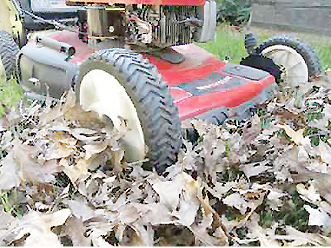By Urban Harvest

In our house, we only put out the trash every six to eight weeks! We have curbside recycling and every three months take glass, food cartons and plastic bags to places that recycle them. But a main reason we don’t use the trash service much is that we recycle all of our yard wastes and kitchen food wastes.
Home and business owners produce a lot of plant wastes and kitchen scraps that can more easily be recy-cled on most lots than they can in a landfill. It is fairly easy to recycle lawn clippings, leaves, branches, logs, Christmas trees, kitchen scraps, and coffee grounds. Even though the City of Houston collects yard debris, you won’t need to buy bags, bag leaves, or pay for someone to bag them if you compost your leaves, yard clippings along with your kitchen waste.
Recycled yard and kitchen wastes improve the clay soil dramatically nature’s way within a few years. Your plants will grow better with less water because the clay particles will glue together into topsoil thus encouraging rain and irrigation to soak in and providing oxygen for root health. The surface organic mat-ter will insulate the soil from surface heat, and organisms that decompose the organic matter will share their remains and wastes with the plants. Such organic wastes are expensive if purchased as compost or mulches so throwing them out is really extravagant.
Most people cut their lawn too often at too short a height. Mowing is a form of plant surgery so it damag-es the grass blades. For a healthy lawn, only mow when it is becoming unsightly and never mow on a schedule. In hot weather avoid mowing before late afternoon.
If you mow at three inches, you need to cut off only an inch and a half every two weeks or in dry weather — longer so as to not damage the grass. Authorities nationwide believe that this height and schedule are best for lawns. This taller lawn will be much greener, healthier, need much less water, require many fewer mowings, create less noise and air pollution and be less work and cost. For obvious reasons, many lawn services dislike such infrequent visits, and may have difficulty mowing on an as-needed basis.
If you are in the habit of bagging clippings, longer grass will make the bagging more difficult. However, if you don’t bag the clippings and just mulch the clippings where they fall, they will decompose quickly and return the nutrients to the lawn where they are needed.
Falling leaves and branches are nature’s way of providing water-conserving soil-cooling mulch under the tree and calories for the microbes that provide nitrogen and other nutrients to the tree roots. Leaf mold is the single best and most expensive soil amendment you can buy in quantity! Thus if at all possible, let leaves and small branches stay where they fall.
If that isn’t possible then mow the leaves and small branches to break them up and let them rot in place. If you must remove them, put them a few inches thick under other trees or shrubs. Cut the bigger branches and logs with saw, loppers, machete or shears until everything is in small flat pieces or is long and straight. Tuck the small pieces discretely under shrubs in out-of-the-way places to rot. Use straight logs as edgings on garden paths or for beds and hide big logs under low lying shrubs. Christmas trees get the same treatment.
Most garden weeds should be used the same way as mulch under shrubs and trees. They can also be put in a compost pile as long as they aren’t large or have long-lived roots like nutgrass and Bermuda grass.
Note that if you would like to use a composter, the City of Houston Green Building Resource Center will be offering compost bins and rainwater barrels for sale at a discounted price in October. While the inter-net abounds in composting information, if you want more, the GBRC has offered an extensive compost certification program once a year.
This column is produced by Urban Harvest. Learn about gardening classes, community gardens and orchards, farmers markets and more at Urban Harvest website. The article is written by Bob Randall, Ph.D., who is the former executive director and a cofounder of Urban Harvest. He is also the author of "Year Round Vegetables, Fruits and Flowers for Metro-Houston". You may contact him at YearRoundGardening@comcast.net.